Neil Barofsky - Bailout: An Inside Account of How Washington Abandoned Main Street While Rescuing Wall Street
Here you can read online Neil Barofsky - Bailout: An Inside Account of How Washington Abandoned Main Street While Rescuing Wall Street full text of the book (entire story) in english for free. Download pdf and epub, get meaning, cover and reviews about this ebook. year: 2012, publisher: Free Press, genre: Detective and thriller. Description of the work, (preface) as well as reviews are available. Best literature library LitArk.com created for fans of good reading and offers a wide selection of genres:
Romance novel
Science fiction
Adventure
Detective
Science
History
Home and family
Prose
Art
Politics
Computer
Non-fiction
Religion
Business
Children
Humor
Choose a favorite category and find really read worthwhile books. Enjoy immersion in the world of imagination, feel the emotions of the characters or learn something new for yourself, make an fascinating discovery.
- Book:Bailout: An Inside Account of How Washington Abandoned Main Street While Rescuing Wall Street
- Author:
- Publisher:Free Press
- Genre:
- Year:2012
- Rating:5 / 5
- Favourites:Add to favourites
- Your mark:
Bailout: An Inside Account of How Washington Abandoned Main Street While Rescuing Wall Street: summary, description and annotation
We offer to read an annotation, description, summary or preface (depends on what the author of the book "Bailout: An Inside Account of How Washington Abandoned Main Street While Rescuing Wall Street" wrote himself). If you haven't found the necessary information about the book — write in the comments, we will try to find it.
During the height of the financial crisis in 2008, Barofsky gave up his job as a prosecutor in the esteemed U.S. Attorneys Office in New York City, where he had convicted drug kingpins, Wall Street executives, and perpetrators of mortgage fraud, to become the special inspector general in charge of oversight of the spending of the bailout money. From his first day on the job, his efforts to protect against fraud and to hold the big banks accountable for how they spent taxpayer money were met with outright hostility from the Treasury officials in charge of the bailouts.
Barofsky discloses how, in serving the interests of the banks, Treasury Secretary Timothy Geithner and his team worked with Wall Street executives to design programs that would funnel vast amounts of taxpayer money to their firms and would have allowed them to game the markets and make huge profits with almost no risk and no accountability, while repeatedly fighting Barofskys efforts to put the necessary fraud protections in place. His investigations also uncovered abject mismanagement of the bailout of insurance giant AIG and Geithners decision to allow the payment of millions of dollars in bonusesincluding $7,700 to a kitchen worker and $7,000 to a mail room assistantand that the Obama administrations TARP czar lobbied for the executives to retain their high pay.
Providing stark details about how, meanwhile, the interests of homeowners and the broader public were betrayed, Barofsky recounts how Geithner and his team steadfastly failed to fix glaring flaws in the Obama administrations homeowner relief program pointed out by Barofsky and other bailout watchdogs, rejecting anti-fraud measures, which unleashed a wave of abuses by mortgage providers against homeowners, even causing some who would not have lost their homes otherwise to go into foreclosure. Ultimately only a small fraction (just $1.4 billion at the time he stepped down) of the $50 billion allocated to help homeowners was spent, while the funds expended to prop up the financial systemas Barofsky disclosestotaled $4.7 trillion. As Barofsky raised the alarm about the bailout failures, he met with obstruction of his investigations, and he recounts in blow-by-blow detail how an increasingly aggressive war was waged against his efforts, with even the White House launching a broadside against him. Bailout is a riveting account of his plunge into the political meat grinder of Washington, as well as a vital revelation of just how captured by Wall Street our political system is and why the too-big-to-fail banks have only become bigger and more dangerous in the wake of the crisis.
***
FROMBAILOUT
The further we dug into the way TARP was being administered, the more obvious it became that Treasury applied a consistent double standard. In the late fall of 2009, as I began receiving the results of two of our most important audits, the contradiction couldnt have been more glaring. When providing the largest financial institutions with bailout money, Treasury made almost no effort to hold them accountable, and the bounteous terms delivered by the government seemed to border on being corrupt. For those institutions, no effort was spared, with government officials often defending their generosity by kneeling at the altar of the sanctity of contracts. Meanwhile, an entirely different set of rules applied for home- owners and businesses that were most assuredly small enough to fail.
Nowhere was the favoritism toward Wall Street more evident than with the governments approach to AIG, where inviolable contract terms were cited to justify the absurd executive bonus payments as well as far richer payouts provided to the megabank counterparties to AIGs CDS deals, honoring even their most reckless bets. For homeowners and small business owners, though, contracts went from being sacrosanct to inconvenient irrelevancies. So when mortgage servicers blatantly disregarded HAMP contracts by trampling over homeowners rights, Treasury turned to an endless series of excuses to justify its refusal to hold them accountable. Similarly, for more than two thousand auto dealerships, Treasurys auto bailout team sought to void the contractual rights granted them under state franchise laws to shut them down.
Neil Barofsky: author's other books
Who wrote Bailout: An Inside Account of How Washington Abandoned Main Street While Rescuing Wall Street? Find out the surname, the name of the author of the book and a list of all author's works by series.

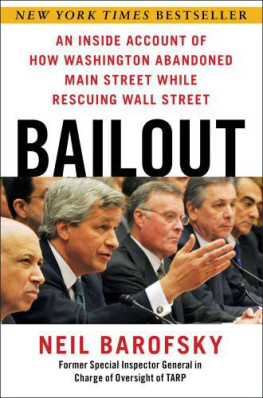

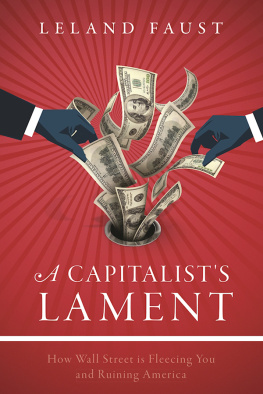
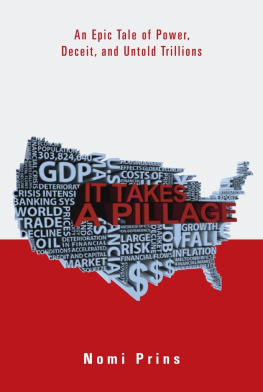
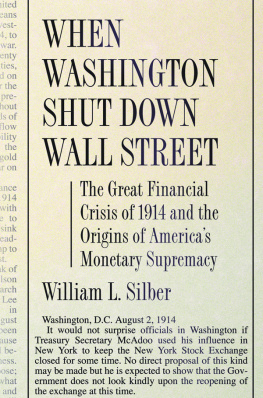
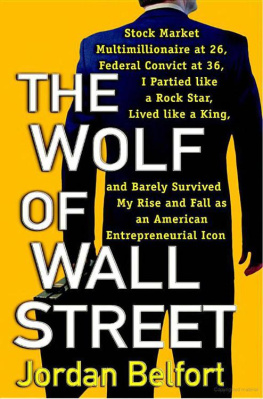
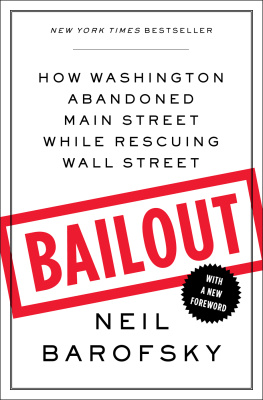


 or visit us online to sign up at
or visit us online to sign up at

